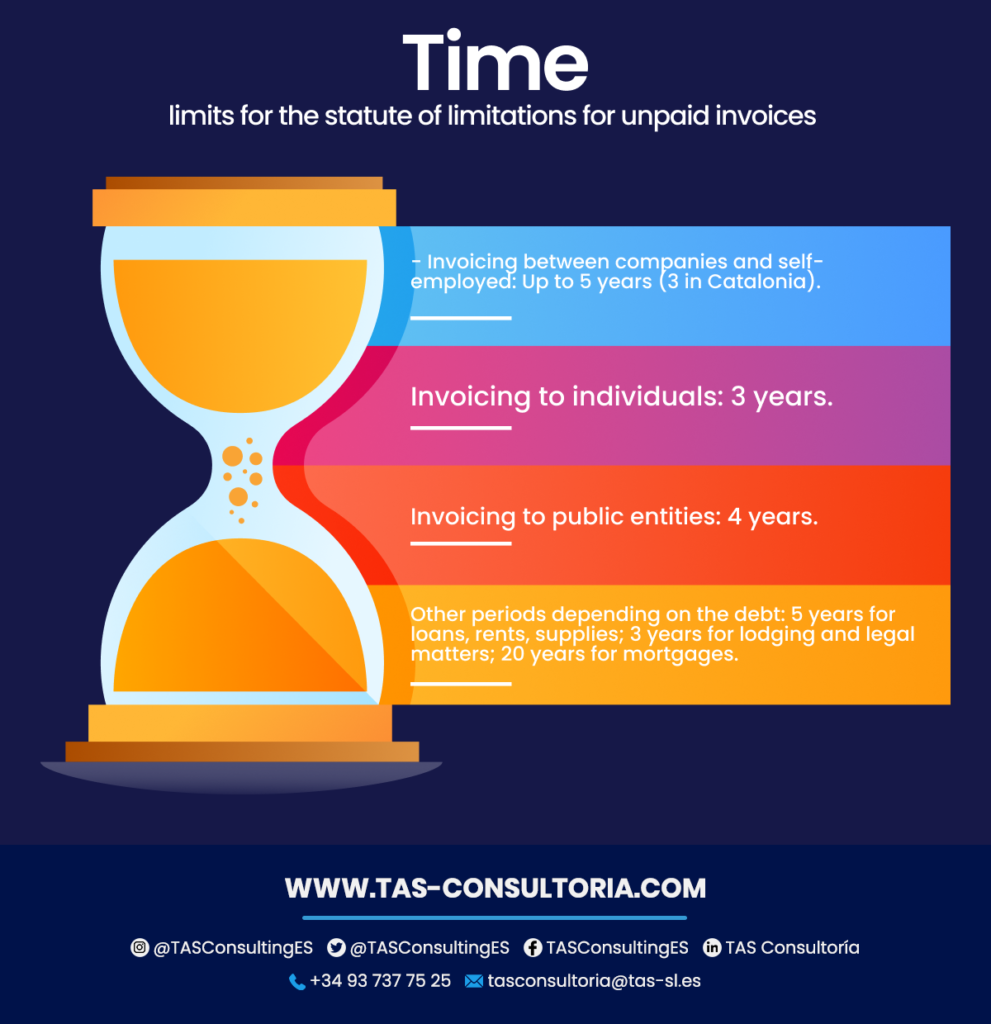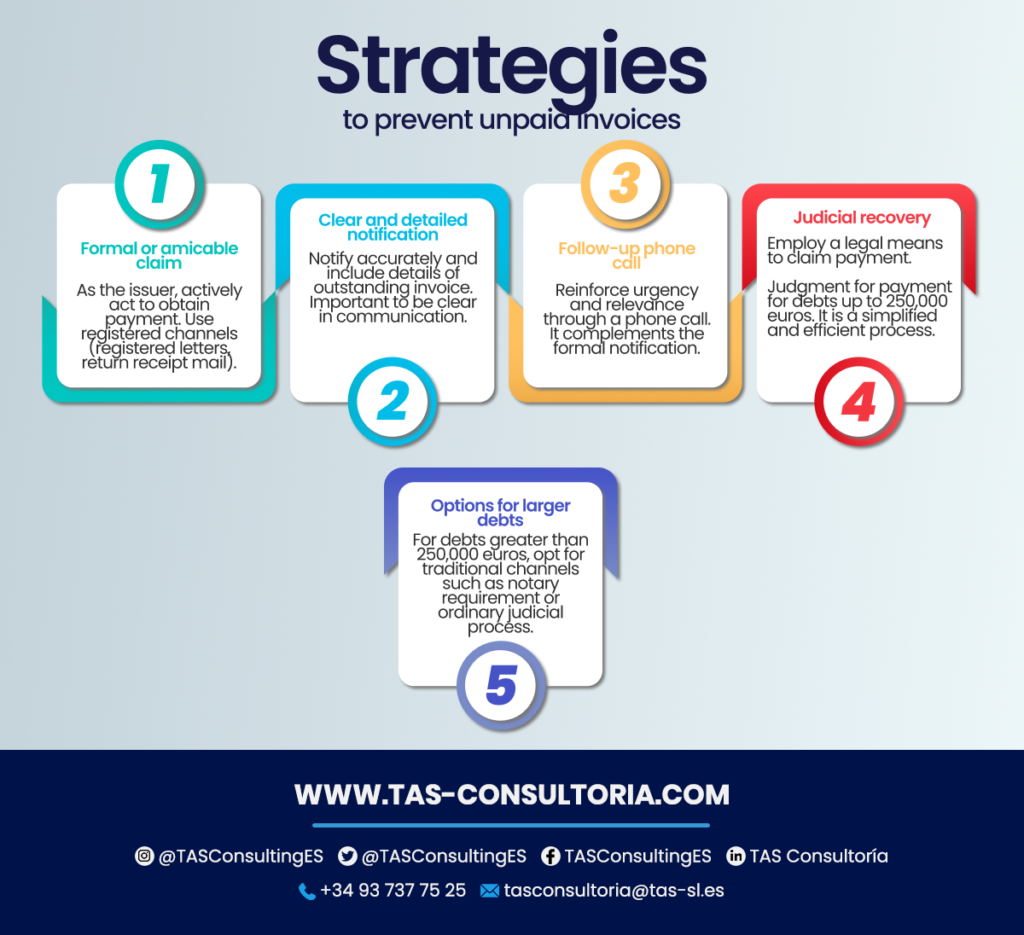
In the complex financial scenario, understanding the issues of when your unpaid invoices are time-barred is essential. Explore in detail the deadlines established in Spain to claim these outstanding debts. From transactions between companies and freelancers to those addressed to public administrations. Below, we will break down each scenario and its time limitations. Read on!
What is the statute of limitations and what are its implications?
The statute of limitations for an unpaid invoice is when a seller, whether self-employed or a company, loses the right to claim an outstanding payment.
This process is a legal tool designed to mitigate uncertainty related to collection rights. This occasionally arises due to a lack of accounting integrity.
However, the statute of limitations for unpaid invoices can be a challenge for many professionals. For, if appropriate action is not taken, they could be deprived. Specifically from the possibility of demanding payment of debts that are outside the time limit.
Within this context, two main reasons can be distinguished that lead to the prescription of invoices:
- First of all, it could be that the issuer of the unpaid invoices has not formally processed the claim for payment.
- Secondly, there is the case of the recipient of the invoices has not acknowledged its obligation to make payment.
You may also be interested in: Form 036 and 037: registering with the tax authorities
What do the laws say about the statute of limitations for unpaid invoices in Spain?
In Spain, legislation protects the self-employed and companies against unpaid debts. One area of great importance in this context is the legal treatment of the statute of limitations for uncollected invoices.
In the past, the rules related to the extinguishment of debts documented in invoices were within the scope of the Civil Code. Article 1964 of this code established a general limitation period of 15 years for unpaid invoices.
However, there was a significant change in this dynamic with the enactment of Law 42/2015 of October 5:
- This legal reform introduced a crucial modification. It determined that the statute of limitations for the recovery of payments mentioned in invoices was reduced to 5 years. Provided that they referred to commercial operations between professionals and individuals. This measure had a substantial impact on the financial and contractual relationship between the parties involved in such transactions.
- It is undeniable that these legal provisions are intended to safeguard the interests of those who provide goods and services. Especially those whose livelihood depends on a constant flow of income to maintain their economic operations. The statute of limitations accelerates remedies for non-compliance for a more equitable environment.
Time periods relating to the statute of limitations on unpaid invoices
The statute of limitations period for the recovery of unpaid invoices varies. It all depends on the category of debtor linked to the unpaid invoice:

In addition, other statutes of limitations relate to unpaid invoices depending on the context of the debt.
- For example, you have a 5-year margin for debts derived from loans, payments or distribution of dividends. Also rent defaults or debts associated with basic services (such as telephone, water or gas).
- Debts contracted with lodging establishments, as well as with legal professionals, are subject to the statute of limitations after 3 years. Whether they are lawyers, judges, notaries, solicitors or registrars.
- The longest statute of limitations period is linked to the repayment of mortgages, which is fulfilled after 20 years.
You may also be interested in: How does the equivalence surcharge work in Spain?
How can I avoid the statute of limitations for unpaid invoices?
The situation where unpaid invoices become time-barred is of concern to many professionals. Fortunately, there are several strategies to avoid this situation and ensure payment for their work.
- One approach available is to pursue a claim for payment in a formal or amicable manner. Under this method, the biller assumes the active role of seeking payment. This involves the need to demonstrate that it has taken concrete steps to seek payment in an appropriate manner.
This involves using registered communication channels, such as sending registered letters or e-mails with acknowledgement of receipt. The notification must be clear and precise. Always mentioning the unpaid invoices and providing all the necessary details for their identification.
Some professionals choose to supplement this formal notification with a telephone call. In order to reinforce the importance and urgency of the matter.
- On the other hand, professionals can also resort to judicial proceedings as a means of claiming unpaid invoices. The payment order is an efficient and economical alternative to recover debts whose amount does not exceed 250,000 euros.
This simplified process streamlines the legal process. It allows professionals to obtain the payment due to them more quickly and without incurring excessive costs. In the event that the amount owed exceeds this limit, it will be necessary to resort to more traditional methods. Either the notarial requirement or the ordinary judicial process.
You can see the summary below:

What happens with Value Added Tax (VAT) in cases of unpaid invoices?
This is a common concern for companies and freelancers. This is because they must face the obligation to pay output VAT on all invoices issued. Regardless of whether these are unpaid or not.
This scenario presents a financial disadvantage, since the professionals must advance the funds corresponding to the VAT. But, without the certainty that they will be able to recover them in case of non-payment.
However, companies have the right to recover the amount of VAT they have advanced in situations of unpaid invoices.
This represents a significant relief for those who face the possibility of losing the funds invested in VAT. And it is an opportunity to balance the costs associated with the services provided.
You may also be interested in: What is the Financial Transaction Tax?
Mastering the statute of limitations for unpaid invoices is essential to safeguard your financial interests. Don’t let unpaid debts fall into oblivion. If you are looking for guidance and sound decisions for your situation, we invite you to request a personalized accounting consultation with our experts. Take action today for a stronger and more secure financial future!




Your email address will not be published .
Required fields are marked with *